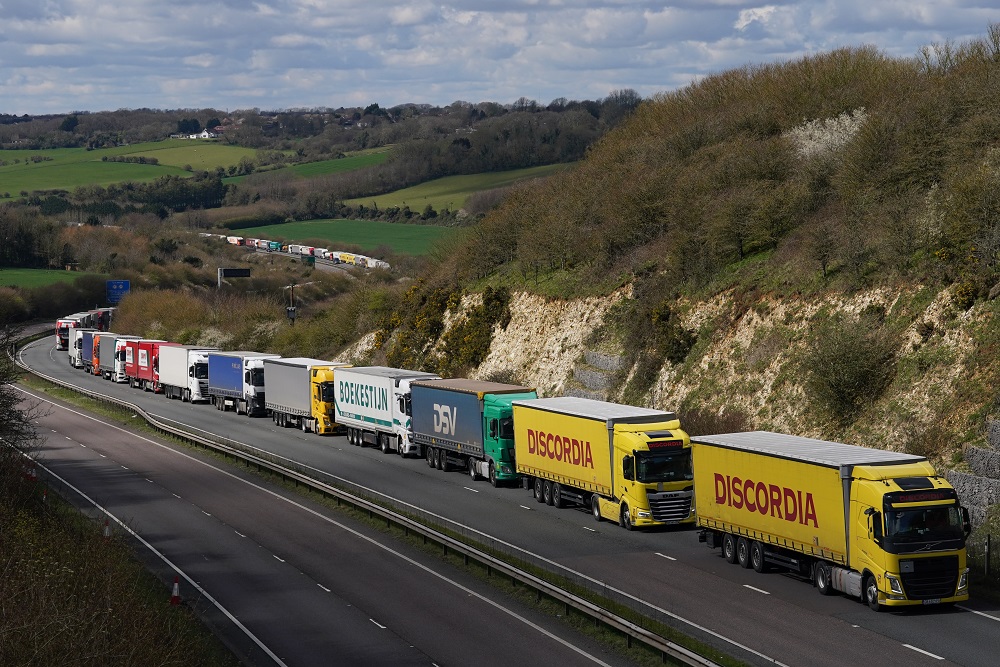Longer lorries to be allowed on UK roads

Longer lorries are to be allowed on UK roads to enable more goods to be carried on fewer journeys, the UK Government’s Department for Transport (DfT) has announced.
This is despite fears about the risks for pedestrians and cyclists, and the potential for damage to roadside infrastructure.
The vehicles have a larger tail swing – meaning their rear end covers a greater area when turning – and extended blind spots.
Lorry trailers up to 61ft (18.55m) long – some 6ft 9in (2.05m) longer than the standard size – will be permitted to be used from May 31 under legislation being laid in Parliament on Wednesday.
The DfT said the new lorries will be able to move the same volume of goods as current trailers in 8% fewer journeys, meaning they will “make the world of difference” for businesses such as bakery chain Greggs.
The policy is expected to generate £1.4 billion in economic benefits and take one standard-size trailer off the road for every 12 trips.
An 11-year trial of longer lorries has demonstrated they are safe for use on public roads, according to the DfT.
The study found they were involved in “around 61% fewer personal injury collisions than conventional lorries”, the department said.
A Government-commissioned report published in July 2021 revealed that 58 people were injured in incidents involving longer lorries between 2012 and 2020.
Resilient
Roads minister Richard Holden said: “A strong, resilient supply chain is key to the Government’s efforts to grow the economy.
“That’s why we’re introducing longer semi-trailers to carry more goods in fewer journeys and ensure our shops, supermarkets and hospitals are always well stocked.
“These new vehicles will provide an almost £1.4 billion boost to the haulage industry, reduce congestion, lower emissions and enhance the safety of UK roads.”
Longer lorries will be subject to the same 44-tonne weight limit as those using standard trailers.
Operators will be legally required to ensure appropriate route plans and risk assessments are made to take the length of the lorries into account.
Greggs supply chain director Gavin Kirk said: “We welcome the introduction of longer semi-trailers (LSTs) into general use.
“Since 2013, Greggs has been operating LSTs from our national distribution centre in Newcastle.
“We were early adopters of the trial as we saw a significant efficiency benefits from the additional 15% capacity that they afforded us.”
But Norman Baker, from lobby group Campaign for Better Transport, said: “Rather than longer lorries, the Government should be working to ensure more freight is moved by rail- an efficient, safe and clean alternative with just one freight train capable of removing up to 129 lorries from our roads.”
Steve Gooding, director of the RAC Foundation, said: “The safety record shown during the extensive trials is encouraging but one can imagine problems if these lorries leave the strategic roads and end up off the beaten track.
“Particular attention will need to be paid to diversion routes when motorways and major A roads are closed for repair, as they often are.”
Support our Nation today
For the price of a cup of coffee a month you can help us create an independent, not-for-profit, national news service for the people of Wales, by the people of Wales.





Good luck trying to get those through Rhayader on A470 or A44.
There needs to be a special Eastern European Satnav setting to stop them from trying to cross Llangynidr bridge. The Albanian and Czech versions of Garmin can’t handle Mid-Wales at all.
I would tend to agree with you, though my English version of Garmin cannot even cope with England. It also contains, I have discovered, what is called a “Garmin Adventure” feature (Yes honestly, look it up!) which takes one on a routes that involve the least direct journey from A to B with the narrowest possible roads. Mr Baker, from lobby group Campaign for Better Transport, is spot on with his comments, but that will not happen under a Market Fundamentalist Government. Yet another reason to make sure that we vote out the Tories if they ever dare to have… Read more »
Most of the current size of lorry gets problems with manouverability once away from Motorways and the better class of A road. Maybe more goods should travel by rail. Oh dear, there’s hardly any rail left in Wales fit for heavy freight.
From the people that brought us smart motorways, expect casualties…
Look up B-doubles
A lot of myths about these trailers were debunked by lorry drivers on Jason Mohamed’s Radio Wales phone in – because the axles are steerable, they are less likely to “scrape” the road surface when turning and can turn down L shaped streets. They are two foot longer than average trailers so barely noticeable difference. Yes rail freight should be encouraged but the increased efficiency of these trailers mean less journeys and less fuel